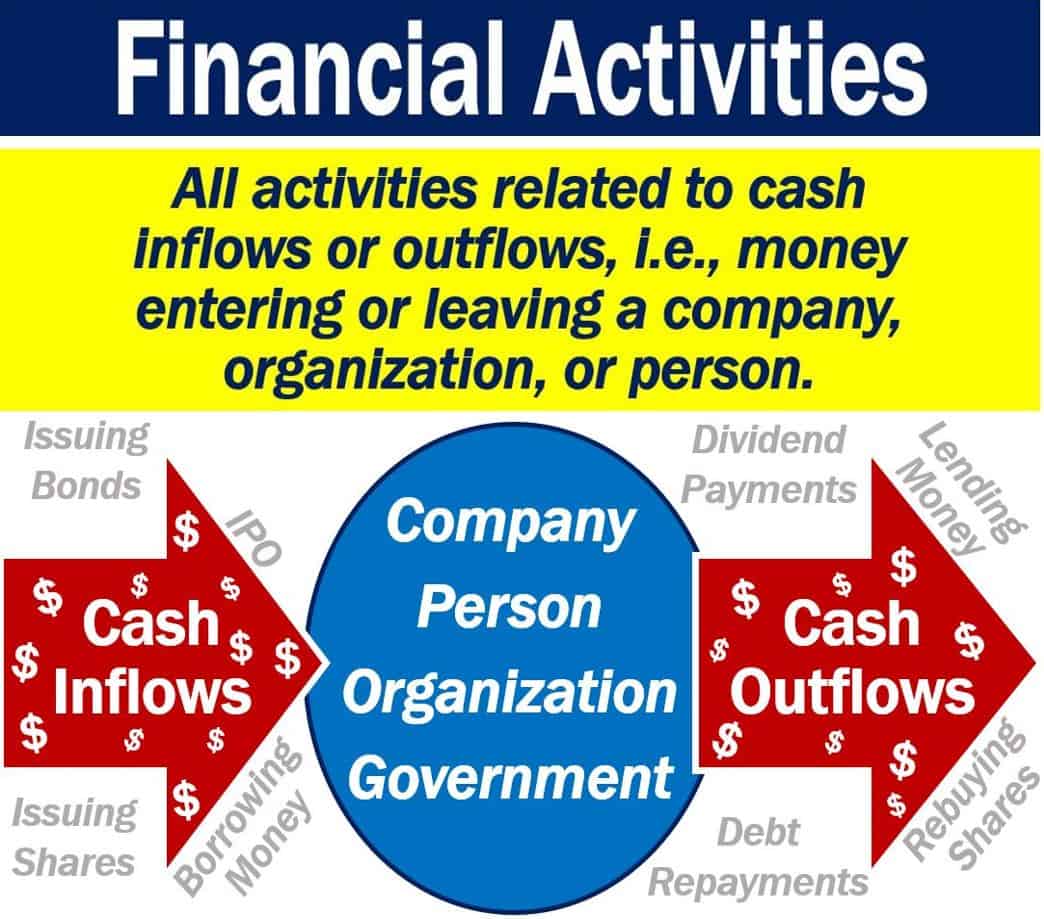What are financial activities? Definition and examples
Financial Activities are activities that companies undertake to help achieve their economic goals and objectives. They include events and transactions that affect a business’ equity and long-term liabilities. Anything to do with the movement of money, i.e., cash inflows and outflows, is a financial activity.
Purchasing and selling assets or products, organizing accounts, and maintaining accounts, for example, are financial activities. Arranging loans, selling bonds or stocks are also financial activities.
In this context, the term ‘stocks’ means the same as ‘shares.’ Hence, the term ‘stocks and shares.’
Put simply; financial activities are anything companies do with specific monetary objectives.
Finance Xod has the following definition of financial activities:
“The buying and selling of assets and products, maintaining accounts, organizing accounts, and issuing bonds or stocks. They also include arranging loans and other monetary business activities.”
In accounting, we display financial activities on the statement of cash flows. Specifically, they are the third set of cash activities.

Financial activities – cash flows
The term includes the flow of cash into and out of the company, i.e., cash inflows and outflows. This money is from investors and creditors.
New loans that the company issues, for example, are inflows from creditors.
Loan and interest payments, on the other hand, at cash outflows.
In other words, whenever money is flowing in or out of a company, there is a financial activity.
Regarding cash inflows and outflows, MyAccountingCourse.com writes:
“Cash inflows from investors occur from newly issued stock or contributions from partners; whereas, cash outflows from investors consist of dividends and owner distributions.”
Dividends are payouts to shareholders from a company’s profit.
Some financial activities, however, have no effect on a company’s cash. If a company finances a project directly, for example, cash remains unaffected.
A company’s cash account never alters if it uses a mortgage for a new building.
In this case, the liability account increases, as does the building account.
Financial activities – examples
Below is a list of the most common financial activities that accountants enter in the statement of cash flows:
- Issuance of bonds and other debts (cash inflow).
- Sale of shares (cash inflow).
- Repurchasing of company shares (cash outflow).
- Dividend payments (cash outflow).
- Debt repayments (cash outflow).
Regarding large cash inflows/outflows, AccountingTools makes the following comment:
“You should delve into the reasons for a large positive or negative balance in the cash flows from financing activities, since it can, for example, denote the need for a large loan to support ongoing negative cash flows from operations.”
Finance – finances – financial
The word ‘financial‘ is the adjective of the noun or verb finance and the noun finances. However, as you can see below, the noun ‘financials‘ has a specific meaning.
-
Finance
‘Finance’ refers to anything to do with the exchange of certain capital assets between people, companies, or states. Finance is a branch of economics.
-
Finances
‘Finances’ has many meanings. If I want to know how a friend is coping money-wise, I might ask “How are your finances?”
If somebody is in financial trouble, they might say “My finances are a mess!”
-
Financials
In the world of stocks and shares, ‘financials’ refers to the shares of banks and other financial institutions.
If real estate shares are doing well, I might tell a friend “Forget about financials, invest in real estate.” I am telling him or her not to bother with financial institution shares, and to invest in real estate.
Humans begin carrying out financial activities from a very early age. They may start, for example, as soon as a child buys candy and hands over money to a shopkeeper.
The rise of digital currencies and payment platforms has expanded the scope of financial activities, allowing for instant and borderless transactions.
Technological advancements in financial modeling and analytics have significantly enhanced the strategic planning of financial activities for businesses.
Example sentences
Below, you can see some sentences containing “financial activities,” to show you how we use the term in context:
- “The company’s financial activities, such as securing a new line of credit, were key to supporting its expansion into international markets.”
- “During the audit, we will closely examine all records pertaining to financial activities to ensure compliance with the law.”
- “Our financial activity this quarter reflects a significant investment in research and development, underscoring our commitment to innovation.”
- “The board of directors is reviewing the financial activities report to decide on the declaration of the next dividend.”
- “She keeps a meticulous record of her personal financial activities, from daily expenses to long-term investments, to maintain a healthy financial status.”
- “Understanding the financial activities of competitors can provide valuable insights into market trends and business strategies.”
- “The new software promises to simplify the management of financial activities for small business owners, making it easier to track cash flow and prepare for tax season.”
Video – What are Financial Activities?
This interesting video presentation, from our sister channel on YouTube – Marketing Business Network, explains what a ‘Financial Activities’ are using simple and easy-to-understand language and examples.

